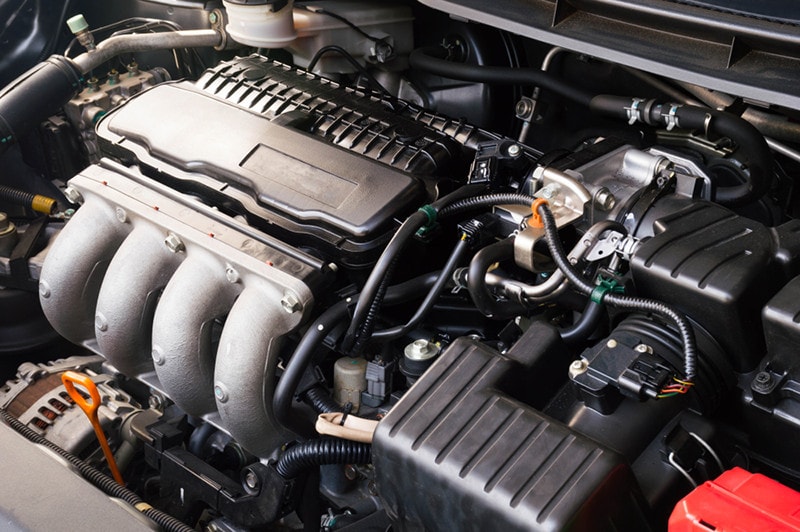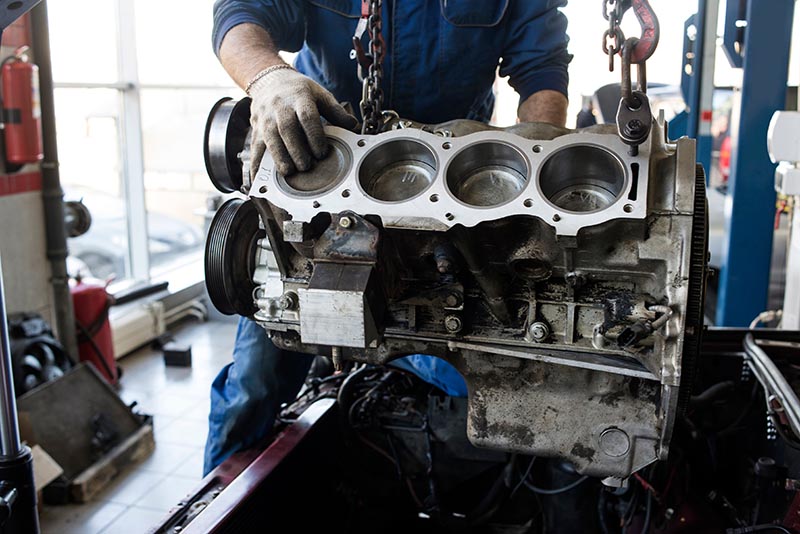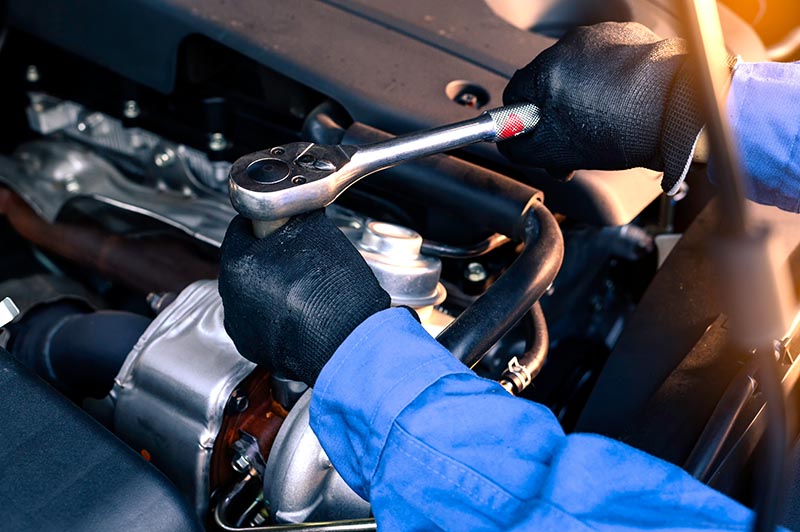What Is a 4-Cylinder Engine and How Does It Work?
-
Codee Chessher
- Last updated:

There are many types of cars, and it can be difficult to keep them all straight. For example, what does a 4-cylinder engine even mean? How is it different from a V6? These engines are some of the most common and widespread engines, with many consumer cars using them to maximize fuel efficiency. Let’s check out exactly what a 4-cylinder engine is, how it works, and more relevant info.

How Do 4-Cylinder Engines Work?
A 4-cylinder engine is just that—an engine with four cylinders. Generally speaking, cylinders are what produce power and make your car move. Each cylinder is composed of several components: a piston, intake valve, spark plug, fuel injector, and exhaust valve. While you can technically put as many or as few cylinders in an engine as you want, four is a good compromise between power and fuel economy.
You see, more cylinders will guzzle more gas to give your car more power, so you’ll be paying a premium at the pump to fill your tank. V6 engines use more gas than 4-cylinder engines, and V8 engines use even more. This is how 4-cylinders got a reputation for fuel economy at the cost of performance and power. In recent years, engineers have developed tricks like variable valve timing and turbochargers that can help the humble 4-cylinder compete with V6s. As a result, the 4-cylinder isn’t the snub it was 20 years ago.
On a technical level, a 4-cylinder engine is like any other engine. The cylinders take in a fuel-air mixture through its intake valve and ignite it with the spark plug. The combustion action delivers explosive power to the pistons, which are connected to your crankshaft. Then power is supplied to your wheels to make your car work.

What Are the Different Types of Engines?
Most 4-cylinder cars are the most efficient and typically the cheapest cars out there, but there are two other main cars you’ve probably heard of. Namely, V6 and V8. Let’s take a closer look at each of those below.
- V6 – V6 engines are typically used in cars and some trucks. They offer more power and a smoother ride than a 4-cylinder engine but use significantly more fuel in the process. A V6 is the best compromise between power and efficiency, with new V6s every year becoming more and more efficient.
- V8 – V8 engines are most commonly used in trucks, SUVs, and some performance vehicles. They provide very high horsepower and torque, which usually makes V8s ideal for towing trailers or boats. The biggest downside of a V8 is that they use more fuel than both 4-cylinders and V6s, which means you might not want to drive one every day.

What Cars Have 4-Cylinders?
Four-cylinder cars are some of the most affordable and fuel-efficient vehicles out there, with most small hybrids today utilizing these engines, along with electric batteries. That said, you’ll find 4-cylinder engines in cars, vans, pickup trucks, and some SUVs. They are much less powerful than V6s, but they’re well known to help save on gas costs. Because those can get high, drivers are seeking the most fuel-efficient cars for commuting.
Advantages of 4-Cylinder Engines
These engines have three distinct advantages: cost, size, and fuel efficiency. While not important to everyone, these are vital factors when deciding what vehicle to buy. See why they’re so important below.
- Cost – Four-cylinder engines have fewer parts than V6 or V8 engines, so they’re cheaper to manufacture. As a direct result, car manufacturers are able to sell it for much less than a larger, more complex engine. This also extends to maintenance and repair costs. These engines are easier to work on and have fewer parts that can fail, so you’ll pay less to keep them in good condition.
- Size – Four-cylinder inline engines are some of the lightest and most compact engines you can put in a car, which makes the engine even more efficient. With less weight for the engine to lug around, it can concentrate on getting you from point A to point B.
- Fuel Efficiency – People hate paying a lot for gas, and 4-cylinders have mind-blowing fuel economy. The Prius, for instance, gets over 50 miles per gallon! While V6s are getting more efficient, 4-cylinders are still the king of fuel economy.

Disadvantages of 4-Cylinder Engines
Despite their advantages, 4-cylinder engines have one major disadvantage: power. Because they can only consume so much fuel due to the limited number of cylinders, a 4-cylinder engine simply can’t produce as much power or torque as a V6. Turbochargers and variable compression help level the playing field, but 4-cylinders are, by and large, not comparable to a V6 as far as performance.
This also makes them unsuitable for towing, which can be a dealbreaker for some people. Even the most souped-up 4-cylinders don’t have the torque to reliably tow boats or trailers, and you should look for a V6 or V8 instead.

Frequently Asked Questions (FAQs)
- Is a 4-cylinder better than a V6? – There’s no single best engine type because they’re both useful to different people. These engines are the best for saving money on gas and lowering maintenance costs, while a V6 is more powerful at the cost of extra fuel costs. However, with car technology advancing at a breakneck pace every day, it’s best to just check out individual cars rather than engine types. Some 4-cylinder cars are just as powerful as a V6.
- How do I know if a 4-cylinder is right for me? – If you don’t care about performance or speed and just want to commute cheaply, a 4-cylinder vehicle is probably the best pick for you. Many 4-cylinders offer similar driving experiences to V6s, but the main pro is always going to be a lower cost. These engines are simply cheaper to buy, which can make them very attractive choices. They have lower repair costs, too.
- How many cylinders can you put in a car? – The engine with the most cylinders is the Bugatti Chiron, which has 16 cylinders. With such an astronomical number of cylinders, the Chiron is capable of speeds up to 261 miles per hour and boasts 1,500 horsepower.

Conclusion
The 4-cylinder engine is the smallest, lightest engine you can find in a car. They’re extremely efficient on gas, making them excellent daily drivers. They also have low maintenance costs but don’t have enough power for many people. They’re incapable of towing trailers or boats, too.
Featured Image Credit: Lek Changply, Shutterstock
Contents
